英语句子成分分析
- 格式:ppt
- 大小:3.03 MB
- 文档页数:18
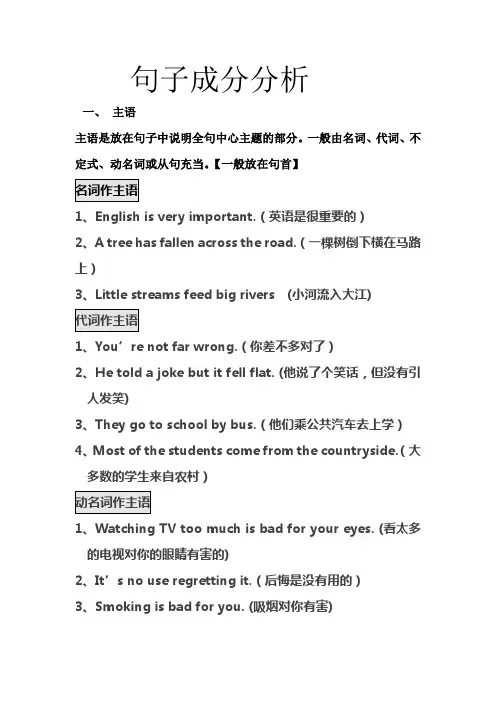
句子成分分析一、主语主语是放在句子中说明全句中心主题的部分。
一般由名词、代词、不定式、动名词或从句充当。
【一般放在句首】1、English is very important.(英语是很重要的)2、A tree has fallen across the road.(一棵树倒下横在马路上)3、Little streams feed big rivers (小河流入大江)1、You’re not far wrong.(你差不多对了)2、He told a joke but it fell flat. (他说了个笑话,但没有引人发笑)3、They go to school by bus.(他们乘公共汽车去上学)4、Most of the students come from the countryside.(大多数的学生来自农村)1、Watching TV too much is bad for your eyes. (看太多的电视对你的眼睛有害的)2、It’s no use regretting it.(后悔是没有用的)3、Smoking is bad for you. (吸烟对你有害)4、To see is to believe.(眼见为实/百闻不如一见)5、It is very hard to get to sleep.(入睡很难。
)6、To find your way can be a problem.(你能否找到路可能是一个问题。
)7、It would be nice to see him again. (如能见到他,那将是一件愉快的事。
)1、Three is enough. (三个就够了)2、Four from seven leaves three.(7减4还剩3)1、Whenever you are ready will be fine. (你无论什么时候准备好都行。
)2、Because Sally wants to leaves doesn’t mean that we have to.(不能说萨利要走因而我们也得走。

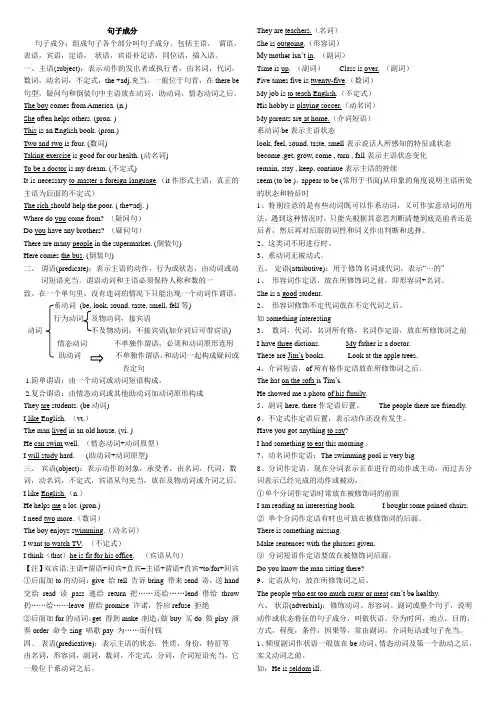
句子成分句子成分:组成句子各个部分叫句子成分。
包括主语,谓语,表语,宾语,定语,状语,宾语补足语,同位语,插入语。
一、主语(subject):表示动作的发出者或执行者,由名词,代词,数词,动名词,不定式,the +adj.充当。
一般位于句首,在there be句型,疑问句和倒装句中主语放在动词,助动词,情态动词之后。
The boy comes from America. (n.)She often helps others. (pron. )This is an English book. (pron.)Two and two is four. (数词)Taking exercise is good for our health. (动名词)To be a doctor is my dream. (不定式)It is necessary to master a foreign language.(it作形式主语,真正的主语为后面的不定式)The rich should help the poor. ( the+adj. )Where do you come from? (疑问句)Do you have any brothers? (疑问句)There are many people in the supermarket. (倒装句)Here comes the bus. (倒装句)二、谓语(predicate):表示主语的动作,行为或状态,由动词或动词短语充当。
谓语动词和主语必须保持人称和数的一致。
在一个单句里,没有连词的情况下只能出现一个动词作谓语。
系动词(be, look, sound, taste, smell, fell等)行为动词及物动词,接宾语动词不及物动词,不接宾语(加介词后可带宾语)情态动词不单独作谓语,必须和动词原形连用助动词不单独作谓语,和动词一起构成疑问或否定句1.简单谓语:由一个动词或动词短语构成。
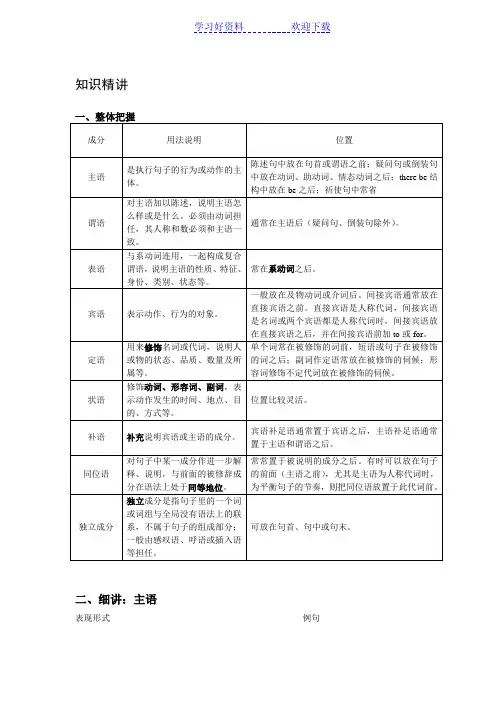
知识精讲二、细讲:主语表现形式例句三、谓语四、表语五.宾语1.宾语的分类六、定语巧学妙计:一般来说,单个形容词、分词、代词、数词或名词作为定于位于被修饰的名词的前面,叫做“前置定语”;副词、介词短语、形容词短语、分词短语、不定式(短语)和定语从句作定语位于被修饰的名词的后面,叫做“后置定语”。
七、状语1. 状语的分类八、补语九、同位语练习与巩固一、指出下列句子划线部分是什么句子成分:1.The students got on the school bus.2. He handed me the newspaper.3. I shall answer your question after class.4. What a beautiful Chinese painting!5. They went hunting together early in the morning.6. His job is to train swimmers.7. He took many photos of the palaces in Beijing.8. There is going to be an American film tonight.9. He is to leave for Shanghai tomorrow.10. His wish is to become a scientist.11. He managed to finish the work in time.12. Tom came to ask me for advice.13. He found it important to master English.14. Do you have anything else to say?15. To be honest, your pronunciation is not so good.16. Would you please tell me your address?17. He sat there, reading a newspaper.18. It is our duty to keep our classroom clean and tidy.19. He noticed a man enter the room.20. The apples tasted sweet.二、分析下列句子成分1. Our school is not far from my home.2. It is a great pleasure to talk with you3. All of us considered him honest.4. My grandfather bought me a pair of sports shoes.5. He broke a piece of glass.6.He made it clear that he would leave the city.7. ---I love you more than her,child .8. Tees turn green when spring comes.9. They pushed the door open.10. Grandma told me an interesting story last night.三.划分句子成分练习1.They are working on the farm now.2.Seeing is believing3.All of us like Kobe Bryant very much4.She became a doctor in 19985.The book lying on the floor are mine6.Suddenly it begins to rain7.To catch the train ,I got up early yesterday8.I always find her happy9.He wonders If I still study English10.The letter which I received the day before yesterday was a friend of mine11.We always work hard at English.12.He said he didn't come.13.She watched her daughter playing the piano.14.Speaking doesn't mean doing.15.Bye the time I got to the station,the train had left.16.The children bought their parents a car for the 25th anniversary of their marriage.17.It takes me an hour to get there.四、选择填空:( )1. ____ will leave for Beijing.A. Now there the manB. The man here nowC. The man who is here nowD. The man is here now( ) 2. The weather ____.A. wet and coldB. is wet and coldC. not wet and coldD. were wet and cold ( ) 3. The apple tasted ____.A. sweetsB. sweetlyC. nicelyD. sweet( ) 4. He got up ____ yesterday morning.A. latelyB. lateC. latestD. latter( )5. The actor ______at the age of 70.A. deadB. diedC. dyedD. deaded学习好资料欢迎下载( )6. ____ were all very tired, but none of ____ would stop to take a rest.A. We, usB. Us, weC. We, ourD. We, we( )7. He found the street much ______.A. crowdB. crowdingC. crowdedD. crowdedly ( ) 8.I think _____necessary to learn English well.A. itsB. itC. thatD. that is( ) 9. The dog ____ mad.A. looksB. is lookedC. is being lookedD. was looked ( )10.I will never forget the day ______ I joined the army.A.thatB. whenC. in whichD. Where四、1~5 CBDBB 6~10 ACBAB。
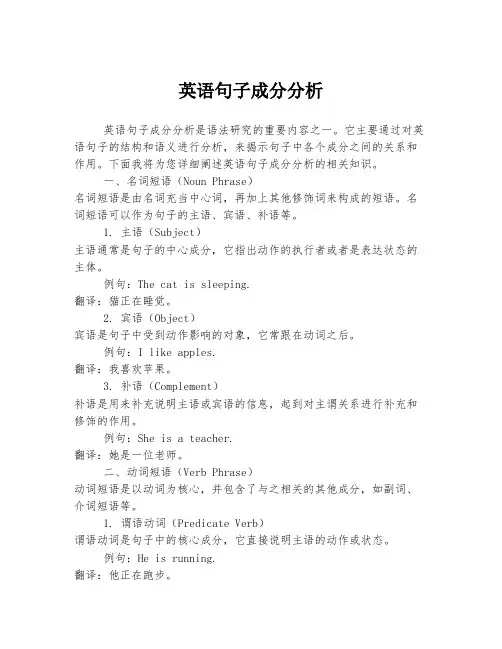
英语句子成分分析英语句子成分分析是语法研究的重要内容之一。
它主要通过对英语句子的结构和语义进行分析,来揭示句子中各个成分之间的关系和作用。
下面我将为您详细阐述英语句子成分分析的相关知识。
一、名词短语(Noun Phrase)名词短语是由名词充当中心词,再加上其他修饰词来构成的短语。
名词短语可以作为句子的主语、宾语、补语等。
1. 主语(Subject)主语通常是句子的中心成分,它指出动作的执行者或者是表达状态的主体。
例句:The cat is sleeping.翻译:猫正在睡觉。
2. 宾语(Object)宾语是句子中受到动作影响的对象,它常跟在动词之后。
例句:I like apples.翻译:我喜欢苹果。
3. 补语(Complement)补语是用来补充说明主语或宾语的信息,起到对主谓关系进行补充和修饰的作用。
例句:She is a teacher.翻译:她是一位老师。
二、动词短语(Verb Phrase)动词短语是以动词为核心,并包含了与之相关的其他成分,如副词、介词短语等。
1. 谓语动词(Predicate Verb)谓语动词是句子中的核心成分,它直接说明主语的动作或状态。
例句:He is running.翻译:他正在跑步。
2. 直接宾语(Direct Object)直接宾语是跟在及物动词后面,指出受到动作影响的对象。
例句:She loves flowers.翻译:她喜欢花。
3. 间接宾语(Indirect Object)间接宾语是在及物动词之后,介词之前,用来指示动作的对象。
例句:He gave me a book.翻译:他给了我一本书。
三、形容词短语(Adjective Phrase)形容词短语是由形容词作为中心词,并可以加上其他修饰词来修饰名词或代词。
例句:The tall girl is my sister.翻译:那个高个子的女孩是我的姐姐。
四、副词短语(Adverb Phrase)副词短语是由副词作为中心词,并可以有其他修饰词来修饰动词、形容词或副词。
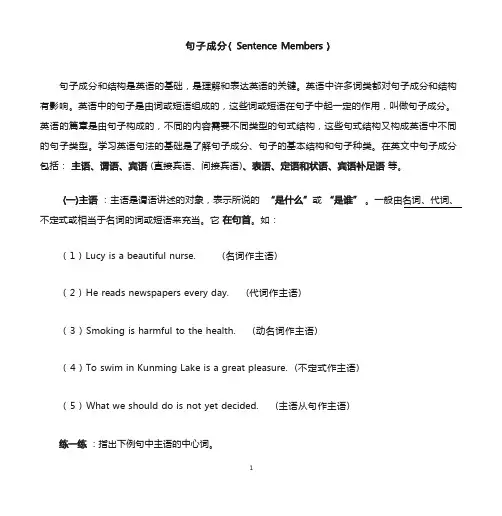
句子成分和结构是英语的基础,是理解和表达英语的关键。
英语中许多词类都对句子成分和结构有影响。
英语中的句子是由词或短语组成的,这些词或短语在句子中起一定的作用,叫做句子成分。
英语的篇章是由句子构成的,不同的内容需要不同类型的句式结构,这些句式结构又构成英语中不同的句子类型。
学习英语句法的基础是了解句子成分、句子的基本结构和句子种类。
在英文中句子成分包括:直接宾语、间接宾语等。
:主语是谓语讲述的对象,表示所说的或。
一般由名词、代词、不定式或相当于名词的词或短语来充当。
它( 1 ) Lucy is a beautiful nurse. (名词作主语)( 2 ) He reads newspapers every day. (代词作主语)( 3 ) Smoking is harmful to the health. (动名词作主语)( 4 ) To swim in Kunming Lake is a great pleasure. (不定式作主语)( 5 ) What we should do is not yet decided. (主语从句作主语):指出下例句中主语的中心词。
11).The teacher with two of his students is walking into the classroom.2).There is an old man coming here.3).The useful dictionary was given by my mother last year.4).To do today's homework without the teacher's help is very difficult.说明主语或。
谓语(谓语部分里主要的词) 和主语在人称和数两方面必须一致。
它如: His parents are teachers. (系动词和表语一起作谓语)We study hard. (行为动词作谓语)We don’t finish reading the book. (助动词和行为动词一起作谓语)He can speak English. (情态动词和行为动词一起作谓语):选出句中谓语的中心词。
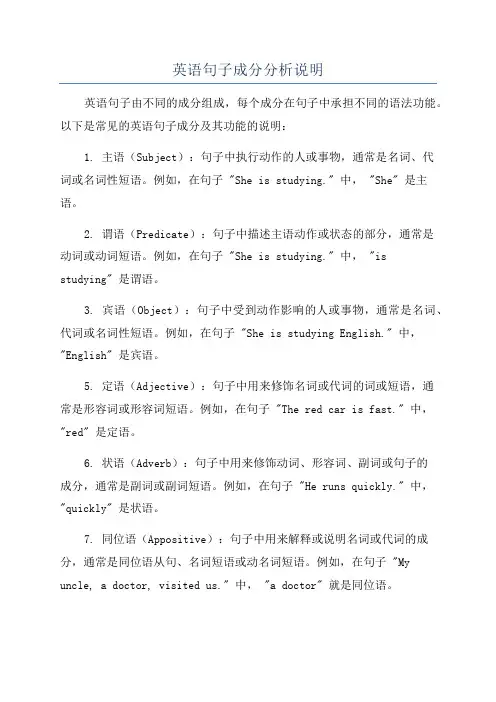
英语句子成分分析说明英语句子由不同的成分组成,每个成分在句子中承担不同的语法功能。
以下是常见的英语句子成分及其功能的说明:1. 主语(Subject):句子中执行动作的人或事物,通常是名词、代词或名词性短语。
例如,在句子 "She is studying." 中, "She" 是主语。
2. 谓语(Predicate):句子中描述主语动作或状态的部分,通常是动词或动词短语。
例如,在句子 "She is studying." 中, "is studying" 是谓语。
3. 宾语(Object):句子中受到动作影响的人或事物,通常是名词、代词或名词性短语。
例如,在句子 "She is studying English." 中,"English" 是宾语。
5. 定语(Adjective):句子中用来修饰名词或代词的词或短语,通常是形容词或形容词短语。
例如,在句子 "The red car is fast." 中,"red" 是定语。
6. 状语(Adverb):句子中用来修饰动词、形容词、副词或句子的成分,通常是副词或副词短语。
例如,在句子 "He runs quickly." 中,"quickly" 是状语。
7. 同位语(Appositive):句子中用来解释或说明名词或代词的成分,通常是同位语从句、名词短语或动名词短语。
例如,在句子 "My uncle, a doctor, visited us." 中, "a doctor" 就是同位语。
8. 表语(Predicative):句子中用来说明主语的状态、性质或身份的成分,通常是形容词、名词或名词性短语。
例如,在句子 "She is tall." 中, "tall" 是表语。
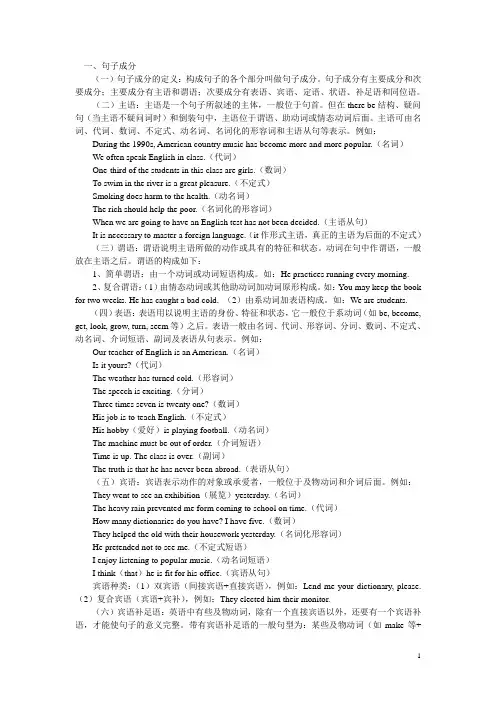
一、句子成分(一)句子成分的定义:构成句子的各个部分叫做句子成分。
句子成分有主要成分和次要成分;主要成分有主语和谓语;次要成分有表语、宾语、定语、状语、补足语和同位语。
(二)主语:主语是一个句子所叙述的主体,一般位于句首。
但在there be结构、疑问句(当主语不疑问词时)和倒装句中,主语位于谓语、助动词或情态动词后面。
主语可由名词、代词、数词、不定式、动名词、名词化的形容词和主语从句等表示。
例如:During the 1990s, American country music has become more and more popular.(名词)We often speak English in class.(代词)One-third of the students in this class are girls.(数词)To swim in the river is a great pleasure.(不定式)Smoking does harm to the health.(动名词)The rich should help the poor.(名词化的形容词)When we are going to have an English test has not been decided.(主语从句)It is necessary to master a foreign language.(it作形式主语,真正的主语为后面的不定式)(三)谓语:谓语说明主语所做的动作或具有的特征和状态。
动词在句中作谓语,一般放在主语之后。
谓语的构成如下:1、简单谓语:由一个动词或动词短语构成。
如:He practices running every morning.2、复合谓语:(1)由情态动词或其他助动词加动词原形构成。
如:You may keep the book for two weeks. He has caught a bad cold. (2)由系动词加表语构成。
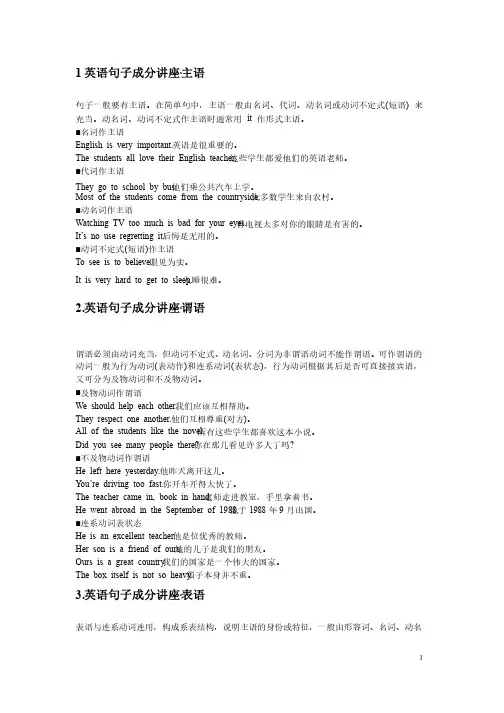
1英语句子成分讲座·主语 句子一般要有主语。
在简单句中,主语一般由名词、代词、动名词或动词不定式(短语) 来充当。
动名词、动词不定式作主语时通常用充当。
动名词、动词不定式作主语时通常用 it 作形式主语。
作形式主语。
■名词作主语名词作主语English is very important. 英语是很重要的。
英语是很重要的。
The students all love their English teacher. 这些学生都爱他们的英语老师。
这些学生都爱他们的英语老师。
■代词作主语代词作主语They go to school by bus. 他们乘公共汽车上学。
他们乘公共汽车上学。
Most of the students come from the countryside. 大多数学生来自农村。
大多数学生来自农村。
■动名词作主语动名词作主语Watching TV too much is bad for your eyes. 看电视太多对你的眼睛是有害的。
看电视太多对你的眼睛是有害的。
It’s no use regretting it. 后悔是无用的。
后悔是无用的。
■动词不定式(短语)作主语作主语To see is to believe. 眼见为实。
眼见为实。
It is very hard to get to sleep. 入睡很难。
入睡很难。
2.英语句子成分讲座·谓语谓语必须由动词充当,谓语必须由动词充当,但动词不定式、但动词不定式、但动词不定式、动名词、动名词、分词为非谓语动词不能作谓语。
分词为非谓语动词不能作谓语。
可作谓语的可作谓语的动词一般为行为动词(表动作)和连系动词(表状态),行为动词根据其后是否可直接接宾语,又可分为及物动词和不及物动词。
又可分为及物动词和不及物动词。
■及物动词作谓语及物动词作谓语We should help each other. 我们应该互相帮助。
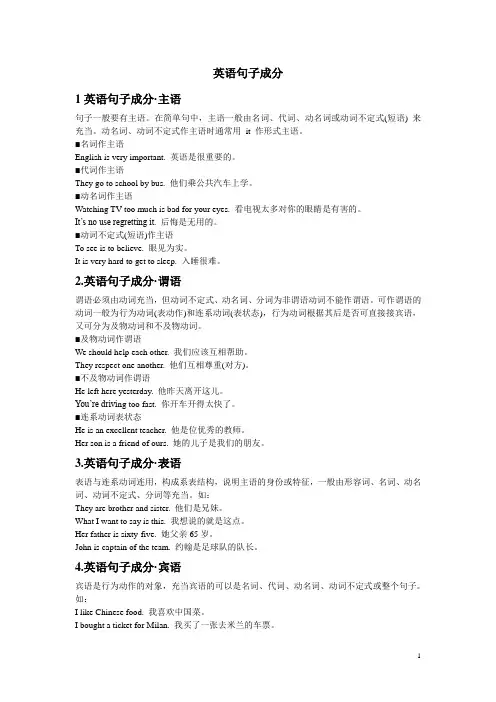
英语句子成分1英语句子成分·主语句子一般要有主语。
在简单句中,主语一般由名词、代词、动名词或动词不定式(短语) 来充当。
动名词、动词不定式作主语时通常用it 作形式主语。
■名词作主语English is very important. 英语是很重要的。
■代词作主语They go to school by bus. 他们乘公共汽车上学。
■动名词作主语Watching TV too much is bad for your eyes. 看电视太多对你的眼睛是有害的。
It’s no use regretting it. 后悔是无用的。
■动词不定式(短语)作主语To see is to believe. 眼见为实。
It is very hard to get to sleep. 入睡很难。
2.英语句子成分·谓语谓语必须由动词充当,但动词不定式、动名词、分词为非谓语动词不能作谓语。
可作谓语的动词一般为行为动词(表动作)和连系动词(表状态),行为动词根据其后是否可直接接宾语,又可分为及物动词和不及物动词。
■及物动词作谓语We should help each other. 我们应该互相帮助。
They respect one another. 他们互相尊重(对方)。
■不及物动词作谓语He left here yesterday. 他昨天离开这儿。
Y ou’re drivi ng too fast. 你开车开得太快了。
■连系动词表状态He is an excellent teacher. 他是位优秀的教师。
Her son is a friend of ours. 她的儿子是我们的朋友。
3.英语句子成分·表语表语与连系动词连用,构成系表结构,说明主语的身份或特征,一般由形容词、名词、动名词、动词不定式、分词等充当。
如:They are brother and sister. 他们是兄妹。
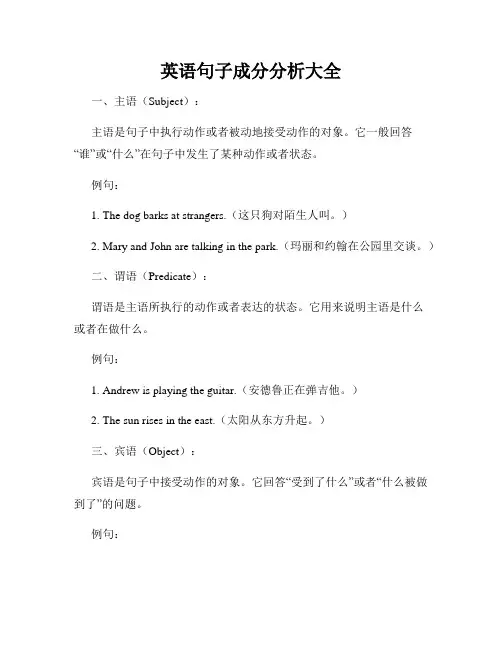
英语句子成分分析大全一、主语(Subject):主语是句子中执行动作或者被动地接受动作的对象。
它一般回答“谁”或“什么”在句子中发生了某种动作或者状态。
例句:1. The dog barks at strangers.(这只狗对陌生人叫。
)2. Mary and John are talking in the park.(玛丽和约翰在公园里交谈。
)二、谓语(Predicate):谓语是主语所执行的动作或者表达的状态。
它用来说明主语是什么或者在做什么。
例句:1. Andrew is playing the guitar.(安德鲁正在弹吉他。
)2. The sun rises in the east.(太阳从东方升起。
)三、宾语(Object):宾语是句子中接受动作的对象。
它回答“受到了什么”或者“什么被做到了”的问题。
例句:1. The teacher assigns homework to the students.(老师布置作业给学生。
)2. She bought a new car.(她买了一辆新车。
)四、表语(Predicate Nominative/Predicate Adjective):表语是用来说明主语的身份、性质、状态或者特征的成分。
它通常位于系动词后面,与主语相连。
例句:1. The cake smells delicious.(蛋糕闻起来很好吃。
)2. He became a doctor.(他成为了一名医生。
)五、定语(Adjective):定语用来修饰名词或者代词,可以说明它们的性质、状态或者特征。
例句:1. I saw a black cat.(我看到了一只黑猫。
)2. This is an interesting book.(这是一本有趣的书。
)六、状语(Adverb):状语用来修饰动词、形容词、副词或者全句,可以说明方式、时间、地点、原因等。
例句:1. Tom quickly ran to catch the bus.(汤姆快速地跑过去赶公交车。
英语句子成分分析分析解析在英语中,句子可以被分解为不同的成分,包括主语、动词、宾语、定语和状语等。
下面是一些常见的句子成分及其分析解析:1. 主语(Subject):句子中的主要人或事物,执行动作或被动作所指向。
例如:I went to the store.分析:主语是I。
2. 谓语(Predicate):句子中的动作或状态,表达主语的行为。
例如:She is reading a book.分析:谓语是 is reading。
3. 宾语(Object):动词的直接接收者或受益者。
例如:He bought a new car.分析:宾语是 a new car。
4. 定语(Adjective):修饰名词或代词的形容词或词组。
例如:The big dog chased the cat.分析:定语是 big。
5. 状语(Adverb):修饰动词、形容词或其他副词的副词或词组。
例如:She runs quickly.分析:状语是 quickly。
例如:He became a doctor.分析:补语是 a doctor。
7. 同位语(Appositive):对名词或代词作进一步解释或补充说明。
分析:同位语是 John。
8. 状语从句(Adverbial Clause):起状语作用的从句。
9. 定语从句(Adjective Clause):起定语作用的从句。
例如:The book that I bought is very interesting.分析:定语从句是 that I bought。
以上是一些常见的英语句子成分及其分析解析。
要准确理解和运用句子成分,需要对语法规则有一定的了解,并在实践中积累经验。
英语句子成分分析英语句子成分分析将句子中的单词或短语分类,以描述其在句子结构中的作用。
这有助于我们更好地理解句子的语法结构和语义。
下面是一些常见的句子成分:1. 主语 (Subject):指出句子中的动作发出者或实施者。
常见的主语形式包括名词、代词或动名词短语。
例句:The book is on the table.(主语:"The book")2. 谓语 (Predicate):表示主语所进行的动作、状态或存在的方式。
一般由动词或动词短语构成。
例句:She is playing tennis.(谓语:"is playing")3. 宾语 (Object):指示主语所作用的对象。
有时是动词的直接宾语,也可以是间接宾语或介词短语。
例句:He gave me a gift.(直接宾语:"a gift",间接宾语:"me")4. 表语 (Predicate Nominative):用于表示主语是什么或具有什么特征。
一般由名词、形容词或名词短语构成。
例句:She is a doctor.(表语:"a doctor")5. 定语 (Adjective Modifier):用来修饰名词或代词的词语。
通常位于其所修饰的名词或代词之前。
例句:I bought a red car.(定语:"red")6. 状语 (Adverbial Modifier):用来修饰动词、形容词、副词或整个句子的词语或短语。
例句:He ran quickly to catch the bus.(状语:"quickly")7. 补语 (Complement):用来补充、说明主语或宾语的信息,使句子更完整。
分为主语补语和宾语补语。
例句:She became a teacher.(主语补语:"a teacher")8. 插入语 (Parenthetical Expression):用来插入句子中,对句子进行附加说明或强调。
英语句子成分分析大全一个句子至少由两部分构成,即主语和谓语,它们是句子的主要成分。
句子的次要成分包括宾语(包括双宾语中的直接宾语和间接宾语),表语,定语(包括前置定语及后置定语),状语,同位语(包括限制性同位语及非限制性同位语),补语及呼语。
一.主语:是一句话的中心,整句话都谈它的情况。
如:They XXX.(他们曾是老师。
) Time flies.(时光飞逝。
)这两句话中分别由代词They,名词Time作主语。
二.谓语:是对主语加以陈述,表示主语的行为或者状态。
谓语必须由动词或动词短语充当,因此动词不定式、动名词、不能作谓语。
且谓语动词可以体现时态,单复数的语法现象。
如:They XXX.(他们曾是老师。
) XXX.(他喜欢唱歌。
)这两句话分别由动词were(are的过去式),enjoys singing(enjoy doing动词短语)作谓语。
其中were表现出句子的时态为过去时态,且主语的人称为第一人称,enjoyssinging表现出句子的时态为普通现在时,且主语的人称为第三人称。
三.宾语:表示动作的承受者。
宾语放在及物动词或者介词之后。
如:I play with him. (我和他玩。
) I like Chinese food.(我喜欢中国菜。
)这两句话平分别由人称代词him,名词food作宾语。
直接宾语与间接宾语:有的动词能够接双宾语,直接宾语指的是动词所涉及的物,间接宾语是指受益于动词所表示行为的人。
如:He gave me a book.(他给了我一本书)He gave a book to me这句话中a book为间接宾语,me为间接宾语。
又如:XXX.(我妈妈买了一个书包给我。
)这句话中schoolbag为直接宾语,me为间接宾语。
四.表语:用来说明主语的性质或状态。
接在系动词之后,其中接在系动词be后是最常见的情况。
系动词:看起来闻起来听起来感觉起来老是保持三变。
look smell sound feel be keep getseem turnXXX如They XXX.(他们曾是老师。
英语语法——英语句子成分分析I.八大成分的概念和构成1.主语(名词代词形):句子的主体,是谓语陈述,说明的对象。
2.谓语:表示主语的行为或进行的活动。
3.宾语:行为或活动的对象,接受者或受影响者。
5.补语:补充说明。
(由动词类别来决定)6.定语:对名词性形式进行范围限定。
7.同位语:对被修饰对象进行补充说明或进一步解释。
8.状语:修饰词,短语,从句和整句。
位置:自由自在。
1)修饰性状语:(时间,地点,肯定,否定,程度,频度,方式,伴随,原因,目的,比较等)。
2)连接性状语:(顺序,递进,转折,让步,结果,推论,比较)。
3)评述性状语:修饰整个句子,表示说话人的看法或态度。
II.成分关系1.补语跟着宾语表语跑:补语跟在宾语和表语的后面构成宾补和表补。
把有宾补的句子变成被动语态,则宾补就变成了主补。
To love others makes us happy…to love ourselves makes us lonely.(宾补)We are made happy to love others…we are made lonely to love ourselves.(主补)爱他人使我们幸福,在自己使我们孤单。
2.定语,同位(语)专把名词踹:定语,同位语修饰名词性形式Experience is the best teacher.(被定语所修饰的形式为名词)They are going to Melbourne, the beautiful city in southern Australia.(同位语所修饰的形式为名词)3.谓语动词由状语修饰When you reach for the stars, you may not quite get one, bu t you won’t come up with a handful of sand either.你想摘下天上的星星,可能一个也摘不下;但也不会一无所获。
英语句子成分结构详解一、英语语句基本结构分析:(一)主谓宾结构:1、主语:可以作主语的成分有名词(如boy),主格代词(如you),数词,动词不定式,动名词等。
主语一般在句首。
注意名词单数形式常和冠词不分家!eg: The boy comes from America.He made a speech.Two and two is four.To be a teacher is my dream.Doing a research is a necessary step of covering a story.2、谓语:谓语由动词构成,是英语时态、语态变化的主角,一般在主语之后。
谓语可以是不及物动词(vi.)没有宾语,形成主谓结构,eg:We come.Many changes took place in my home town.注(以下这些词是不及物动词:表发生、出现的,如:take place, appear, happen, break out; 表来、去,如:come, go 等)3、宾语:宾语位于及物动词之后,一般同主语构成一样,不同的是构成宾语的代词必须是‘代词宾格’,如:me,him,them等。
除了代词宾格可以作宾语外,名词,动名词,不定式等可以作宾语。
eg:I will do it tomorrow.The boy needs a pen.I like swimming.I like to swim this afternoon.(二)主系表结构:1、主语:同‘主谓宾’结构。
2、谓语:联系动词(Link verb):be动词(am,is,are,was,were,have been);其他联系动词如:become成为,turn变成,go变和感官动词如:feel, touch, hear, see等。
其特点是联系动词与其后的表语没有动宾关系,表语多为形容词或副词,既,不可能是宾语。
英语句子成分分析英语句子成分分析一.主语:主语(subject) 是一个句子的主题( theme),是句子所述说的主体。
它的位置一般在一句之首。
可用作主语的有单词、短语、从句乃至句子。
1.名词作主语。
如:A tree has fallen across the road. (一棵树倒下横在路上。
)Little streams feed big rivers. ( 小河流入大江。
)2.代词用作主语。
如:You’re not far wrong. (你差不多对了)。
He told a joke but it fell flat. (他说了个笑话,但没有引人发笑3.数词用作主语。
如:Three is enough. 三个就够了。
Four from seven leaves three. 7减4余3。
4.名词化的形容词用作主语。
The idle are forced to work. 懒汉被迫劳动。
Old and young marched side by side. 老少并肩而行。
5.副词用作主语。
如:Now is the time. 现在是时候了。
Carefully does it. 小心就行。
6.名词化的介词作主语。
如:The ups and downs of life must be taken as they e.我们必须承受人生之沉浮。
7.不定式用作主语。
如:To find your way can be a problem.你能否找到路可能是一个问题。
It would be nice to see him again.如能见到他,那将是一件愉快的事。
8. 动名词用作主语。
如:Smoking is bad for you. 吸烟对你有害。
Watching a film is pleasure, making one is hard work.看电影是乐事,制作影片则是苦事。
9. 名词化的过去分词用作主语。